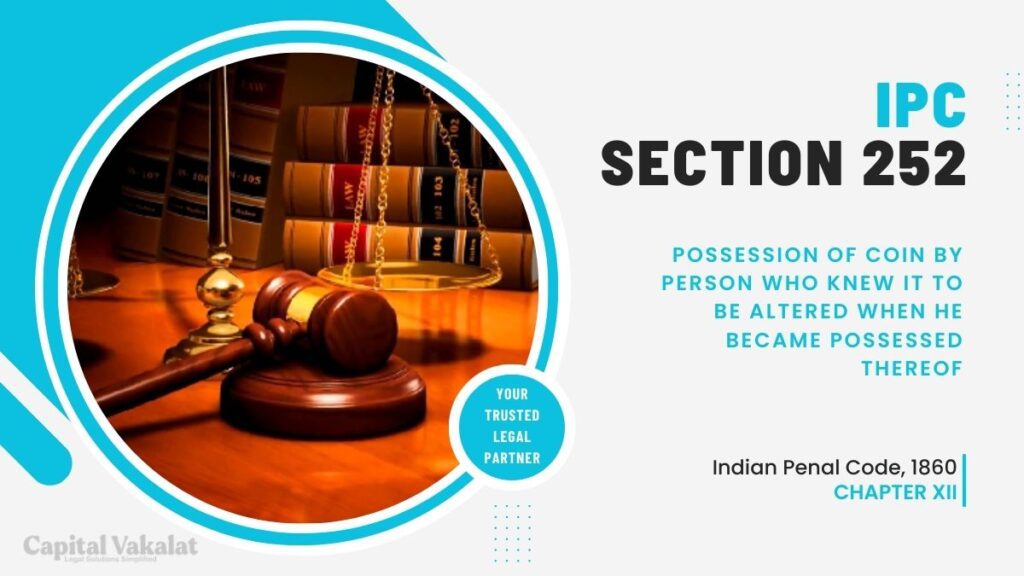In the realm of criminal law, Section 252 of the Indian Penal Code (IPC) holds a distinct place. It addresses a scenario where an individual comes into possession of a coin that they are aware has been altered or tampered with. The section deals with the legal implications and consequences of such actions, shedding light on the significance of intent and knowledge when it comes to criminal offenses.

In this comprehensive article, we will delve into the depths of Section 252 IPC, examining its nuances, implications, and real-world applications.
Understanding Section 252 IPC
Section 252 of the Indian Penal Code, 1860, is a legal provision that deals with the possession of coins by individuals who are aware that these coins have been altered or tampered with when they came into possession of them. This section is crucial in distinguishing between innocent possession and culpable knowledge when it comes to altered coins. It essentially addresses the intent and knowledge of the possessor in such cases.
Section 252 IPC falls under the broader category of offenses related to coins and government stamps. This section makes it clear that possessing a coin that one knows to be altered is a criminal act. The essence of this provision lies in the concept of mens rea, which means “guilty mind.” It requires that the person in possession of the altered coin must have the knowledge that the coin has been tampered with.
The Importance of Mens Rea
Mens rea is a fundamental concept in criminal law. It indicates that a crime isn’t just about the action itself but also the mental state of the person committing the act. In the context of Section 252 IPC, the prosecution must prove that the possessor had the requisite guilty mind, knowing that the coin was altered. This element of mens rea distinguishes innocent possession from criminal intent.
Elements of Section 252 IPC
To understand this section better, let’s break down its essential elements:
- Possession: The individual must be in possession of the coin.
- Knowledge: The person must be aware that the coin is altered.
- Alteration: The coin in question must have undergone some form of tampering or alteration.
- Time of Knowledge: The person must have had this knowledge when they became possessed of the coin.
The Legal Implications
Possessing an altered coin with the knowledge that it is tampered with is considered a criminal act under Section 252 IPC. The offense is non-bailable, and if convicted, the person may face imprisonment. The severity of the punishment depends on various factors, including the nature and extent of the alteration and the intention behind possessing the coin.
Precedents and Case Studies
To understand how Section 252 IPC is applied in real-world situations, we can look at precedents and case studies. There have been instances where individuals have been prosecuted for knowingly possessing altered coins. These cases serve as important references for the legal system and help establish the boundaries of the law.
Challenges in Prosecution
Proving that someone knew a coin was altered at the time of possession can be a challenging task for the prosecution. It requires a careful examination of evidence, including the person’s statements and actions. Defending against a Section 252 charge may involve disputing the element of knowledge or establishing an alternative explanation for the possession.
Defenses Against Section 252 Charges
In cases where someone is accused of violating Section 252 IPC, several defenses may be considered. These include claiming ignorance about the coin’s alteration, challenging the evidence presented, or asserting that the possession was not voluntary.
Relevance in Modern Society
In today’s digital age, the significance of physical coins may seem diminished, but Section 252 IPC remains relevant. It serves as a reminder that even seemingly minor offenses can have legal consequences. Moreover, it underscores the importance of intent and knowledge in criminal law.
Conclusion
Section 252 of the Indian Penal Code deals with the possession of altered coins by individuals who are aware of the alteration at the time of possession. Mens rea, or the guilty mind, is a critical element in proving a case under this section. Understanding the legal implications and the challenges involved in its prosecution is essential. While this provision may appear obscure, it highlights the intricate nature of criminal law.
Frequently Asked Questions
What is the potential punishment for violating Section 252 IPC?
The punishment can vary depending on the circumstances, but it may involve imprisonment.
Are altered coins commonly encountered in legal cases?
Altered coins do appear in legal cases, but they are not as common as other criminal offenses.
What is the significance of mens rea in Section 252 IPC cases?
Mens rea, or the guilty mind, is crucial in establishing that the possessor knew about the coin’s alteration.
How has technology affected the relevance of Section 252 IPC in modern society?
Technology may have reduced the use of physical coins, but the legal principles of intent and knowledge remain relevant in various contexts.